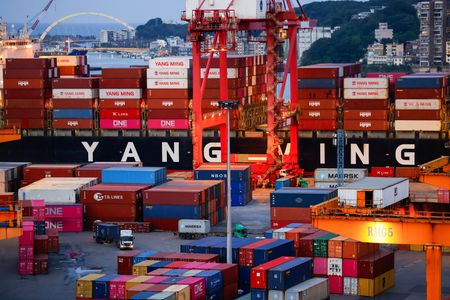By Ben Blanchard
TAIPEI (Reuters) -Taiwan said on Thursday that U.S. tariffs levied on the island were unreasonable and it would discuss them with Washington, partly blaming U.S. tech curbs on China in President Donald Trump’s first term for driving the trade imbalance.
Trump on Wednesday announced across the board import tariffs, with much higher duties for dozens of trading partners, including Taiwan which runs a large trade surplus with the United States and will have a 32% duty placed on its products.
The U.S. tariffs, however, do not apply to semiconductors, a major Taiwan export.
“We feel that these measures are unreasonable, and we are also worried about the possible impact on the global economy,” President Lai Ching-te said on his Facebook page, after meeting with senior cabinet members to discuss how to respond. He did not mention imposing reciprocal tariffs.
Taiwan’s cabinet said in a statement that it would seek clarification and continue talks with Washington.
How the United States has calculated the tariffs was unclear and did not reflect the complementary trade structure between the two sides, the cabinet said.
Taiwan’s exports to and trade surplus with the United States have increased because of U.S. demand for semiconductors and artificial intelligence-related products, as well as Trump’s first-term tariffs and controls on China, it added.
This resulted in “the shift of Taiwan’s supply chain back to Taiwan and an increase in U.S. demand for Taiwan’s information and communications products, reflecting the huge contribution of Taiwan to the U.S. economy and national security”, the cabinet said.
During Trump’s first term in office from 2017 to 2021, he placed some Chinese companies on trade blacklists that curbed their access to crucial U.S. hardware and software, benefiting U.S. friend Taiwan as orders shifted to Taiwanese firms.
Taiwanese government officials have repeatedly said trade with the United States has been skewed by strong demand for Taiwanese technology products, such as advanced semiconductors – a sector dominated by the island, home to major chipmaker TSMC.
TSMC last month announced a new $100 billion investment in the United States.
The company declined to comment on the tariffs, saying it was in its quiet period ahead of its first-quarter earnings on April 17.
In a separate statement after the tariff announcement, the American Chamber of Commerce in Taiwan said the U.S.-Taiwan partnership was “not only a driver of shared economic prosperity but also central to supply chain security and regional stability”.
Trump’s announcement followed the end of the latest round of Chinese war games around Taiwan, which Beijing claims as its own territory despite the objections of Taipei’s government.
The United States is Taiwan’s most important international backer although it does not formally recognise its government, having diplomatic ties only with China.
Still, the White House-provided list of tariff targets, which Trump held up at his press conference, listed Taiwan as a “country”, along with the European Union, which is a trade bloc of 27 member states.
(Reporting by Ben Blanchard; Editing by Michael Perry, Jamie Freed, Peter Graff)










